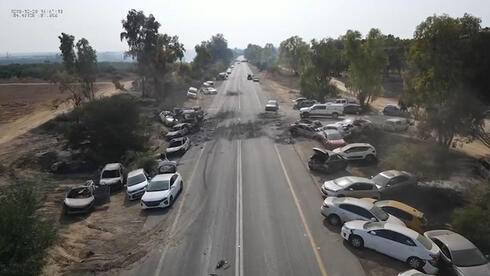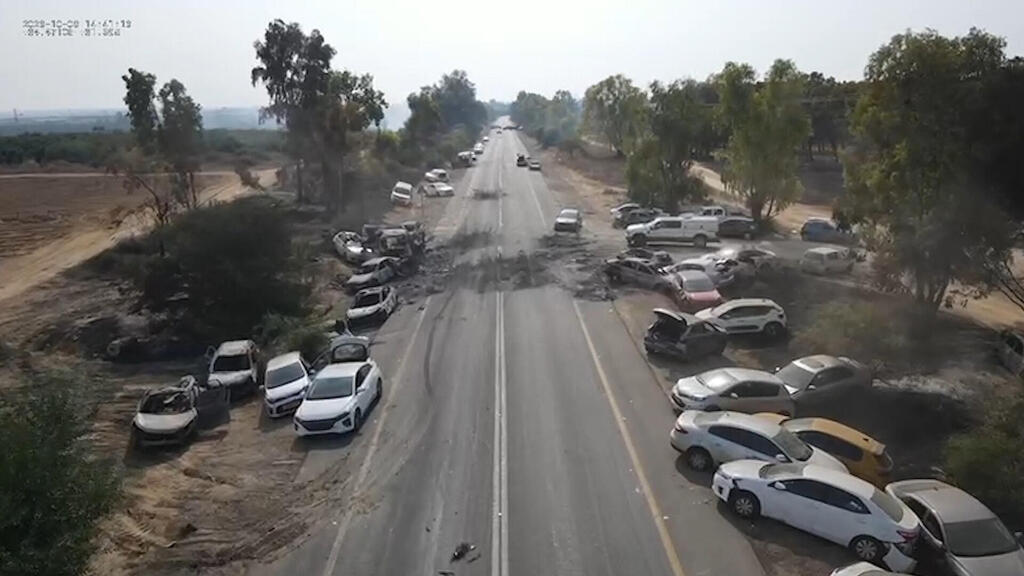
Nova massacre survivors suing IDF, Shin Bet, Police for $55 million in damages
"One phone call by IDF officials to the commander in charge of the party to disperse the party immediately in view of the expected risk would have saved the lives and prevented the bodily and mental injuries of hundreds of party participants," reads the lawsuit filed by 42 survivors of the massacre
A first civil lawsuit following the Hamas massacre on October 7 has been filed with an Israeli court, with 42 survivors of the Nova music festival in Re’im demanding NIS 200 million (approximately $55.5 million) from the state. "One phone call by IDF officials to the commander in charge of the party on the night of 6/10-7/10 to disperse the party immediately in view of the expected risk would have saved the lives and prevented the bodily and mental injuries of hundreds of party participants, including the plaintiffs," reads the lawsuit filed by the plaintiffs in the Tel Aviv District Court against the IDF, the Ministry of Defense, the Israel Police, and the Shin Bet (Israel Security Agency).
The lawsuit was signed by 42 plaintiffs who survived the party and were physically and/or mentally injured. Statements regarding the plaintiffs' detailed medical condition proving their claims were attached to the lawsuit.
As part of the lawsuit filed by attorneys Anat Ginzburg and Gilad Ginzburg, it is claimed that it "refers to the gross negligence of the IDF, the Israel Police, and the Shin Bet regarding the matter, and among other things, the interface between the defendants before the Nova party regarding the licensing and approval of the party, the failure to issue an order to close the party and disperse the participants despite warnings regarding a serious security incident in the area that were received several hours before the massacre... One phone call separated the plaintiffs' lives and the integrity of their bodies and souls from the destruction of their lives. All the defendants had to do was to make a phone call to the responsible parties so that they would disperse the party in view of the warnings which were received on the night between 6/10 - 7/10."
According to the lawsuit, the request for approval of a party called "Unity" that started a day before the Nova party, in the Re'im parking lot, located near the Gaza border, was submitted about three months before the event. At the last moment, permission was requested to extend the party for another day. Senior officers in the Gaza Division expressed security concerns about holding a mass party near the Gaza border, but despite this, approval for the Nova party was received. It was also noted that the operations officer of the Gaza Division opposed the holding of the Nova party because it was an unnecessary security risk and even emphasized that the IDF would have difficulty securing the party throughout the weekend because it was the Simchat Torah holiday and many soldiers had gone home.
As part of the lawsuit, it is claimed that despite the development of an unusual security situation in the night between 6/10-7/10, the defendants did not bother to immediately order the closing of the party and the dispersal of the revelers to their homes. "During the night between October 6-7, at least two situational assessments were carried out in the IDF due to an unusual occurrence at the border of the Gaza Strip, one near midnight and another situational assessment near 03:00, a few hours before the Hamas attack. In these situational assessments no decisions were made and it was agreed to carry out another situational assessment in the morning. In the assessments of the situation, there was concern that there was going to be a day of battle on Saturday, 7/10, which might include an attempted kidnapping of civilians and soldiers or an attempted raid and infiltration by terrorists with the aim of capturing a nearby town or kibbutz. This information came from the intelligence officers of the Southern Command and the Gaza Division, as well as from the Shin Bet. The head of the Shin Bet even arrived at the organization's headquarters in Tel Aviv during the night following the unusual occurrence at the border of the Gaza Strip and held consultations throughout the night. It is therefore impossible to understand how the defendants did not order the party to be dispersed immediately."
It is further alleged that due to his assessment of the situation, the head of the Shin Bet sent the "tequila team" to the Gaza Strip early in the morning, which consists of fighters from the Shin Bet's operational unit and the Israel Border Police’s counter terrorism unit. This team is sent when there is an immediate fear of terrorist infiltration. "Why didn't they immediately order the dispersal of the party?!", asked the lawsuit.
And so, the lawsuit claims, "around 06:30 in the morning, while the participants were dancing to the music, an attack of missiles and rockets began, and after a short time, dozens of terrorists arrived at the party complex in vans and paragliders and began to slaughter the revelers. Some were shot while trying to flee the scene in vehicles, some were burned alive, some hid under bodies, some hid when the Nukhba forces chased after them and witnessed the murder of their friends, some hid in the shelters and saw how the Nukhba murdered their friends. Girls were raped and slaughtered. The slaughter continued until around 12:00 noon. Hamas murdered 364 participants, 40 participants were kidnapped to Gaza, some were released and some are still missing. Many were injured physically and/or mentally, including the plaintiffs."
An expert on behalf of the plaintiffs stated that "it is not clear how the hand of the person approving the event did not tremble when he signed the approval for the party to be held in a very dangerous place, endangering the lives of approximately 3,500 participants. This is a serious failure by the military officials who approved the party. Reasonable military officials would not have approved the holding of the party in light of what had been collected by the division's intelligence and risk assessments."
Among the damages claimed by the victims are: loss of earnings, pain and suffering, and loss of the pleasures of life, loss of earnings for the future, medical expenses and more. Adv. Anat Ginzburg and Adv. Gilad Ginzburg, representing the 42 plaintiffs, stated that "the disaster could have been avoided very easily."














